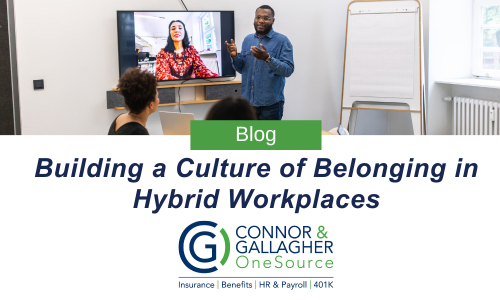Companies offering hybrid work models have become increasingly more popular. Team members work in different locations and maybe even states, some working hybrid, in office, others fully remote. One of the biggest challenges companies face is fostering a sense of belonging among employees as it is easy for employees to feel disconnected in this environment. However, a company with a strong culture of belonging is essential for employee engagement, retention, and productivity.
So, how do organizations build a sense of belonging and ensure their hybrid teams feel included and valued? Below are some strategies and examples to create this culture:
1. Foster Open and Inclusive Communication
Clear and transparent communication is crucial. Ensure all employees, whether remote or in-office, have equal access to company updates, discussions, and decision-making processes.
- Leverage collaboration tools like Microsoft Teams, Slack, or Zoom to keep everyone connected, making it easy for employees to quickly start a call or send a message to their coworkers or managers.
- Encourage leadership to maintain regular check-ins with remote employees by scheduling consistent one-on-one or team touch-base meetings. This is important to implement with all types of employees.
- Standardize meeting practices such as rotating facilitators and allowing everyone to contribute.
2. Create Equal Opportunities for Career Growth
Hybrid work should not create gaps in career development. Ensure that promotions, mentorship, and skill-building opportunities are accessible to all employees.
- Implement structured mentorship programs that include both remote and in-office employees.
- Offer virtual and in-person professional development sessions.
- Use objective performance metrics to evaluate employees fairly.
3. Strengthen Team Connections
Fostering personal relationships among employees strengthens team cohesion.
- Host virtual coffee chats, team-building activities or hybrid happy hours.
- Encourage employees to create interest-based groups (for example, book clubs, gaming groups, gardening groups)
- Plan in-person gatherings or team retreats to foster bonding and collaboration. If possible, consider designating a week for all employees to work together at the headquarters with outings planned.
4. Recognize and Celebrate Contributions
Recognition motivates employees and reinforces a sense of belonging.
- Celebrate achievements publicly in meetings, newsletters, or collaboration platforms.
- Use peer recognition programs where employees can acknowledge each other’s contributions. Additionally, acknowledge any praise or recognition coming from clients or customers.
- Recognize both individual and team successes, ensuring that remote employees are not overlooked.
5. Prioritize Well-Being and Work-Life Balance
A culture of belonging thrives when employees feel supported beyond their work tasks.
- Offer mental health resources and encourage open conversations about well-being. Promote the company’s Employee Assistance Program (EAP) to assist employees.
- Provide flexibility in schedules to accommodate different working styles and personal responsibilities.
- Encourage employees to take breaks and set boundaries between work and personal life.
6. Lead by Example
Leaders play a crucial role in shaping workplace culture. They should:
- Model inclusive behavior by actively engaging with all employees, regardless of location.
- Share their own experiences working remotely or in hybrid settings.
- Request feedback from employees on how to improve inclusivity and belonging.
Building a workplace where employees feel they belong requires intentional effort and promotes higher engagement and motivation, improved collaboration and teamwork, and reduced turnover. By fostering open communication, ensuring equal opportunities, strengthening team connections, recognizing contributions, prioritizing well-being, and leading inclusively, organizations can create a culture and environment where all employees feel valued no matter where they work.
Questions? Contact us at info@GoCGO.com.

The views expressed by the authors on this website do not necessarily reflect the views of the website owners, operators, or any affiliated organizations. This blog is for educational and/or informational purposes only and does not constitute tax, financial, or legal advice.
While we’ve done our best to provide accurate and current information at the time of writing this blog, the information within this article is not guaranteed to be complete, correct, timely, current or up-to-date. Similar to any printed materials, the information may become out-of-date. The Authors undertakes no obligation to update any Information on the Site; provided, however, that the Authors may update the Information at any time without notice in the Authors’ sole and absolute discretion. The Authors reserve the right to make alterations or deletions to the Information at any time without notice.






